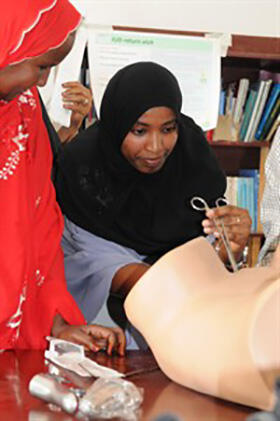
LSTM’s Centre for Maternal and Newborn Health (CMNH) is currently training 25 students on their Diploma in Reproductive Health in Developing Countries course (DRH).
The course runs between January and March and is designed to offer doctors, midwives and other health professionals working in the area of sexual and reproductive health the knowledge and skills they will need to develop and implement strategy in low – middle- income countries.
This course has students from Sudan, Nigeria, Sierra Leone, Alawi, Gambia, Somalia, Ghana, Canada as well as four students from Uganda. Dr Mathais Seviiri, who works in the rural public health facility in the Wakiso District of Uganda, is hoping that the skills he develops during the course will help him build and sustain networks that will link different maternal and newborn projects in his home country. Already responsible for initiating the Health Services Quality Improvement Programme with the Maternal Newborn Quality Improvement Project back home, he is hoping that learning about what he describes as CMNH’s ‘best practice’ will help him become even more effective in helping to save the lives of mothers and their babies.
Registered Midwife Nakitti Barbara Mukasa, who works with with postnatal mothers in the High Dependency Unit in Mulago National Referral and Teaching Hospital in Uganda is hoping that the course will improve her skills as well as leading onto further study opportunities. She has found the international nature of the course rewarding, sharing experiences with other health professionals and talking about best practice.
The twelve week course is run by CMNH in partnership with the Royal College of Obstetricians and Gynaecologists (RCOG) and is delivered using a range of teaching methods, including small group work, group discussions and interactive lectures. Dr Regine Unkels who is the course director said: “Through the 12 weeks course participants come to a better understanding of a range of possible strategies that can be used to improve Sexual and Reproductive Health in their own countries and increase their capability to plan, implement and evaluate relevant programmes and interventions. They take away with them not only what they have learned from those delivering the training but also the experiences of their fellow students, forming networks that can be utilised back home.”